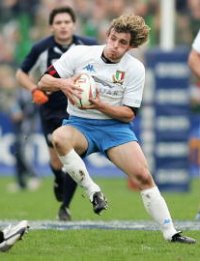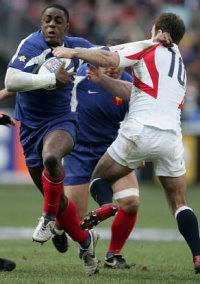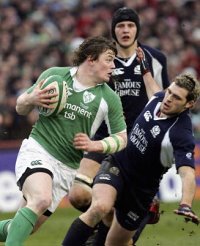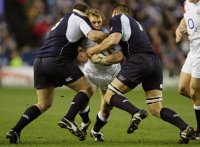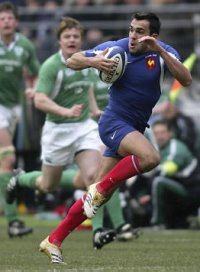Les Bleus weather fine Welsh performance
France look set for Six Nations celebrations after they beat off a commendable effort from Wales to record a 21-16 at the Millennium Stadium on Saturday.

Wales almost put the cat amongst the pigeons with a stunning performance that saw them taking a lead into the final 10 minutes of a pulsating game.
Ireland could yet deny the French a champagne evening in Cardiff but the men in green need to put 34 points past England at Twickenham to clinch the title.
It took 73 minutes for France to take the lead, when a late flash of brilliance from Frédéric Michalak created the opening for Florian Fritz to score under the posts.
Victory meant that only a convincing Ireland win over England at Twickenham would deny France the title -- but the irony is that up until Fritz's score Les Bleus had looked nothing like champions.
A superb try from Hal Luscombe and eight points from the boot of fly-half Stephen Jones earned Wales a deserved 13-6 half-time lead.
France, who had struggled to create anything in the face of some high-pressure defence, hit back through replacement hooker Dimitri Szarzewski but Wales retained their lead until just seven minutes from time.
Defeat was ill-deserved for Wales but after a turbulent season wrecked by injuries, defeats and damaging controversies, home fans head into the summer with their hopes for the future lifted.
Wales scrum-half Mike Phillips, in for the injured Dwayne Peel, produced an immense performance on his first start since the autumn, closely followed by the recalled No.8 Alix Popham.
Both men had points to prove -- though to whom is still up in the air with the Welsh Rugby Union to begin a worldwide search for a new head coach on Monday.
But the behind-the-scenes politics was for another day, because today was about pride and Wales showed it in barrel-loads.
With Italy losing to Scotland in Rome, Wales had escaped the ignominy of crashing from Grand Slam champions to wooden spoon chumps in the space of a season.
Perhaps that lifted the pressure somewhat. Either way, Wales started like a steam train and barely relented for the whole first half.
The French defence strained under the early pressure and conceded a fourth-minute penalty, which Stephen Jones converted from in front of the posts.
France lacked a cutting edge and had to settle for a penalty from Dimitri Yachvili after Ian Gough was spotted holding on at the breakdown.
Wales, in contrast, were attacking France at pace, supporting in numbers and offloading quickly to severely test the blue defence.
Matthew Watkins jinked expertly past French hooker Raphaël Ibañez and offloaded on the angle to Stephen Jones.
Robert Sidoli was tackled off the ball while in support by the retreating Ibanez, who was sin-binned for his efforts.
Wales, back in the lead after Jones landed from the subsequent penalty, made sure they took full advantage of that extra man.
Luscombe escaped down the left wing and slipped a pass inside to Shane Williams, who swerved around Thomas Castaignède.
Williams was scragged just short of the line by Yannick Nyanga but hooked a brilliant one-handed pass back to Luscombe who touched down for his second Test try.
Yachvili slotted a second penalty to make it 13-6 at the interval -- but he did not survive to see the second half as French coach Bernard Laporte introduced Jean-Baptiste Elissalde and Cédric Heymans for Castaignède.
France, their title hopes on the line, reacted well and replacement hooker Szarzewski burrowed over in the corner from a lineout.
But Wales retained a narrow lead, thankful that Elissalde's conversion hit the post and both the scrum-half and centre Damien Traille had missed with penalty attempts early in the second period.
Wales had been forced to make half-time changes themselves and although the introduction of Gavin Henson for Lee Byrne received a mixed reaction, the "Tanned One" soon had the Millennium Stadium on their feet with a towering 50-metre penalty.
Wales came within inches of extending their lead further as France again found themselves strangled in the face of some high-pressure defence.
Shane Williams toed the ball into the French try-zone after it squeezed out from a ruck. Michalak appeared to have dived over the ball and the Wales winger touched down.
But Italian television official Giulio de Santis ruled Michalak had applied downward pressure with his torso and denied Wales the score.
France took full advantage of the escape, surging down the other end. Fritz scored under the posts and Elissalde's simple conversion took France ahead for the first time in the game.
Phillips refused to give up the ghost and burst through a huge gap at the back of a line-out, but the Cardiff scrum-half did not have the pace to beat Aurelien Rougerie on the outside and the chance of an immediate response went begging.
Elissalde booted France five points clear with a penalty -- but still Wales piled forward and it required a try-saving tackle from Michalak to secure the win after Shane Williams had wriggled past Rougerie.
More to follow...
The scorers:
For Wales:
Try: Luscombe
Con: S Jones
Pens: S Jones 3
For France:
Tries: Szarzewski, Fritz
Con: Elissalde
Pens: Yachvili 2, Elissalde
Yellow cards: Ibañez (France) -- off-side, 24
The teams:
Wales: 15 Lee Byrne, 14 Dafydd James, 13 Hal Luscombe, 12 Matthew Watkins, 11 Shane Williams, 10 Stephen Jones, 9 Mike Phillips, 8 Alix Popham, 7 Martyn Williams, 6 Michael Owen (captain), 5 Robert Sidoli, 4 Ian Gough, 3 Adam Jones, 2 Rhys Thomas, 1 Duncan Jones.
Replacements: 16 Mefin Davies, 17 Gethin Jenkins, 18 Jonathan Thomas, 19 Dafydd Jones, 20 Andy Williams, 21 Nicky Robinson, 22 Gavin Henson.
France: 15 Thomas Castaignede, 14 Aurelien Rougerie, 13 Florian Fritz, 12 Damien Traille, 11 Christophe Dominici, 10 Frederic Michalak, 9 Dimitri Yachvili, 8 Thomas Lievremont, 7 Julien Bonnaire, 6 Yannick Nyanga, 5 Jerome Thion, 4 Fabien Pelous (captain), 3 Pieter de Villiers, 2 Raphael Ibañez, 1 Sylvain Marconnet.
Replacements: 16 Dimitri Szarzewski, 17 Olivier Milloud, 18 Lionel Nallet, 19 Olivier Magne, 20 Jean Baptiste Elissalde, 21 Ludovic Valbon, 22 Cedric Heymans.
Referee: Chris White (England)
Touch judges: Tony Spreadbury (England), Donal Courtney (Ireland)
Television match official: Giulio De Santis (Italy)
